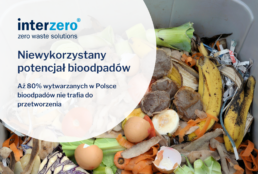Bio-waste was supposed to be a source of ecological fertilizer and clean energy, and its processing was supposed to be a remedy for the growing minimum levels of recycling municipal waste. However, the reality turned out to be far from expectations – the bio-waste collection system is not fully effective, and the potential of this fraction is usually wasted in landfills.
Only 20% of all bio-waste is collected selectively
Currently, in Poland and across the EU , we process only a small percentage of the bio-waste we produce . This applies to both industrial and municipal waste. The Zero Waste and Bio-based Industries Consortium (BIC) report Bio-waste generation in the EU: Current capture levels and future potential estimates that each Pole can potentially generate 247 kg of bio-waste . This sum consists of:
- 112 kg of food waste,
- 135 kg of green waste.
Theoretical potential calculations were made based on a collection of public reports and national data.
However, according to the data provided by the Central Statistical Office, only 52 kg of bio-waste is selectively collected . Where does this difference come from? It most likely results from incorrect segregation of bio-waste – instead of the organic fraction, it ends up in mixed waste.
According to the calculations of the report’s authors, in Poland only the following are selectively collected:
- 9% food waste,
- 20% of all bio-waste (food + green waste).
The average for EU countries is 24.9% for food waste and 30% for the entire bio-waste fraction.
As the authors of the report conclude:
The implementation of food waste collection strategies and practices will be one of the main factors increasing the overall recycling rate of bio-waste in the near future.
The untapped potential of food and catering waste
The aforementioned report by Zero Waste and the Bio-based Industries Consortium (BIC) indicates that as much as 75% of food waste generated in the EU remains unmanaged . This results in the loss of valuable resources that could be processed into natural fertilizer and alternative fuel, as well as excessive methane emissions that occur in landfills. In order to combat waste , Polish entrepreneurs operating in the catering industry and beyond are required to conclude an agreement for the collection and management of food waste they produce . This agreement can be concluded with a municipal company or with a specialized waste collection company, such as Interzero.
Cooperation with Interzero in the field of food waste collection from companies and institutions is a guarantee of its proper management. The catering waste we collect is transferred to specialized processing plants – composting plants and biogas plants, where it is subjected to composting and fermentation processes. Professional collection of food waste is one of the best ways to implement the idea of a closed-loop economy and to avoid legal consequences associated with improper management of bio-waste.
Industrial composters for food and catering waste
Food waste generated in companies can also be managed at source , where it is produced. For this purpose, Interzero offers a range of electric composters for industrial use . They enable waste volume to be reduced by up to 90% and transformed into an excellent, nutrient-rich substrate (pre-compost) that can be used as a soil improver, biomass fuel or anaerobic fermentation raw material. The entire process takes just 24 hours and, thanks to the deodorisation system, is free from unpleasant odours .
The Oklin composter range also includes a device for home use. The Oklin GG-02 compact electric composter can be placed in the kitchen or pantry, providing a more convenient and faster alternative to composting kitchen waste in traditional composters.
Tightening municipal bio-waste collection as a chance to meet strict recycling targets
Bio-waste generated in households that is not managed at source must be selectively collected and then taken away by municipalities. However, the current collection systems are not perfect. In order to make it easier for municipalities to carry out tasks related to the effective collection and subsequent management of bio-waste, IOŚ-PIB has developed a Catalog of Good Practices in the Collection of Bio-Waste , which presents examples of efficient systems for managing biodegradable waste in Poland and Europe.
According to the report of the European Environment Agency, bio-waste constitutes approx. 34% of the stream of all municipal waste produced in the European Union. In Poland, this percentage was 37.4% in 2023. Considering the fact that from 2025 municipalities will have to achieve the 55% level of municipal waste recycling required by EU regulations, it will be necessary to focus on recycling bio-waste as the largest fraction . Is it possible? We talked about the problems and challenges of bio-waste management with Jan Kolbusz, Chief Technologist and President of Mikrobiotech in the Eko Bez Kantów podcast Clean Energy and Fertile Soil: How to Unlock the Potential of Bio-Waste?
Sources:
- https://biconsortium.eu/publication/bio-waste-generation-eu-current-capture-levels-and-future-potential-0
- https://stat.gov.pl/obszary-tematyczne/srodowisko-energia/srodowisko/ochrona-srodowiska-2024,1,25.html
- https://magazynbiomasa.pl/bioodpady-komunalne-jaki-to-potencjal-sprawdz-koniecznie/
